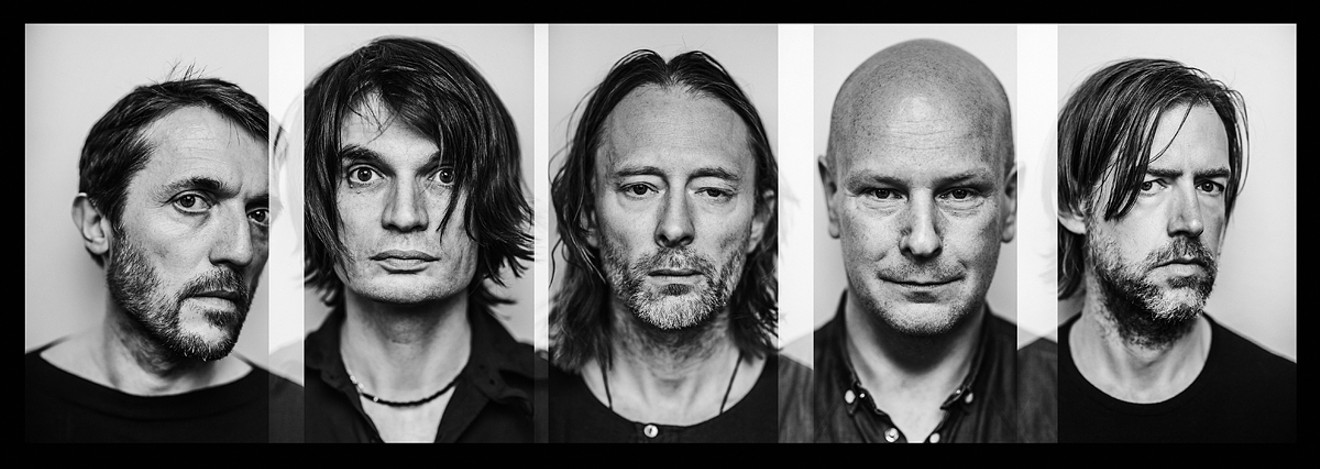For many years, being a fan of the English rock band Radiohead meant three little words: "True Love Waits."
That's the name of the sentimental ballad that long served as the Holy Grail of the band's unreleased tracks. First heard on 2001's I Might Be Wrong: Live Recordings, it was used for years as an intro to the band's live performances of "Everything in Its Right Place," swapped out on different occasions with "After the Gold Rush" by Neil Young, "Unravel" by Björk, and others. Last year, however, came the coup de grace: The song finally appeared at the end of the band's ninth LP, A Moon Shaped Pool. For many, it was a miracle.
More than any other era — and owing to its mercurial style, Radiohead is certainly the one band that can be easily split into eras among albums — the time surrounding A Moon Shaped Pool's release has been
Unlike most bands' followings, Radiohead fans number in the hundreds of thousands, their fierce devotion to the group so extreme it invites ridicule from the uninitiated. Type "Radiohead fans are" into Google, and the top three suggestions are "pretentious," "smart," and "the worst." A Radiohead fan's persona can be seen in a Reddit thread where users describe someone by their favorite album. OK Computer: "You scoff at all the sheeple around you," "you like it when it rains because it makes everyone gloomy." Kid A: "You describe yourself as a music expert," "you're so much better than those kids in your high school that listen to Top 40," "you can always talk to me or talk to the lovely people at the suicide hotline."
According to these stereotypes, Radiohead fans are self-important, self-styled music aficionados who sneer at the masses who aren't quite as intellectual as they. They're also deeply depressed and lonely but think their grim disposition makes them special.
So what makes the band's fans so proudly obsessive?
Type "Radiohead fans are" into Google, and the top suggestion is "pretentious."
tweet this
For one, Radiohead excels at creating settings for its albums. From 1997's OK Computer on, each record has received cover art and packaging that both reflects the music within and stands on its own as art. The most ambitious projects also tell a story, whether through Kid A's apocalyptic paintings and comics, OK Computer's cold collage of modern malaise, or The King of Limbs' ghostly naturalism. Along with Stanley Donwood, the artist who produces all of the band's artwork and is considered an additional member, Radiohead is one of the few bands that strives to create a sophisticated visual world for its music to inhabit. Part of the appeal of collecting physical Radiohead releases is simply because they're art objects, things of beauty that look good on a shelf or a wall.
That artistic depth has made it easy for a community to spring up and maintain itself for as long as the internet has been around. Supplementing Radiohead's frequently updated website W.A.S.T.E. are several equally impressive fan-built destinations, from OG traditional fan sites At Ease and Green Plastic and databases such as Citizen Insane to message boards like the Radiohead subreddit. When I joined the subreddit in 2012, it was the place to go for updates on the band's world tour, bootlegs, and fannish miscellany such as art and photos of user collections. It was also much more intimate, with fewer than 15,000 readers; today the site has 50,000. With Radiohead, there's always plenty to talk about and more people than ever willing to talk about it.
But perhaps more than anything, Radiohead fandom is simply a personality trait. The stereotypes about the band's devotees — pretentious, depressed loners — may be cruel, but they can also be accurate. Those descriptions, for instance, easily describe me in high school. I was the only person I knew who listened to Radiohead, and I liked it that way. I was obsessed with having the good taste to cultivate a sense of superiority. I had no close friends and didn't go out of my way to make any. I spent most of my time on the internet. I wanted only to escape suburbia. I was also miserable, and even today I wonder how much of it was caused by my surroundings and how much was my unwillingness to adapt. I longed to be understood while retreating into sounds I considered obscure.
"Why don't you listen to some happy music if you're so sad?" people outside the bubble of depression might prescribe. But to me, Radiohead's music was not
Radiohead will return to Miami this Thursday. Many fans at the show will anticipate "True Love Waits." But when I see the band, I'll probably flash back to sitting on a bus, iPod headphones in, listening to "There There" on the way to school.
Radiohead
7:30 p.m. Thursday, March 30, at American Airlines Arena, 601 Biscayne Blvd., Miami; 786-777-1000; aaarena.com. Tickets are sold out.













